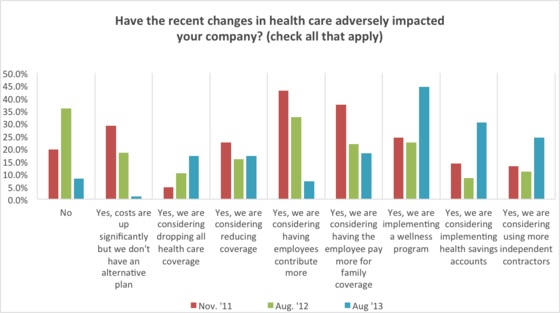Carriers are gradually coming to terms with the effects of the new health care law, and what they must do to comply, according to the Transport Capital Partners Third Quarter Survey.
Open enrollment under the Affordable Care Act begins today, Oct. 1, and deadlines for businesses are fast approaching. The trucking industry has gradually learned more about this major change through press coverage, health insurers, and new government-sponsored websites.
As implementation of the new health law draws near, the number of carriers reporting the law has made no difference to their business dropped from 36% a year ago to 8% this quarter. Carriers are taking various steps in order to comply, and strategies for dealing with the increased costs have shifted.
In November 2011, 43% of carriers indicated they were likely to have employees contribute more toward health costs. Today, carriers are more likely to implement wellness programs (44%) and health savings plans (30%). The number who anticipate opting out of the program all together by using independent contractors has grown from 13% two years ago to 24% this quarter.
Smaller Carriers at a Disadvantage
The response to the new health care law varies dramatically by size of business. Smaller carriers are more likely than larger carriers to consider dropping all coverage (30% vs. 10%). They are also more likely to reduce coverage (12% vs. 4%), and to have their employees contribute more (24% vs. 15%).
This, in part, reflects the fact that small employers – with fewer than 50 employees – have a different set of options under the new law.
”Smaller carriers are at a disadvantage to find and retain drivers if they cannot compete with the health packages offered by larger carriers,” noted Richard Mikes, TCP partner.
Larger carriers are more likely to have employees pay more for family coverage (48% vs. 36%), or to institute a health saving account (35% vs. 21%).
www.TruckingInfo.com
